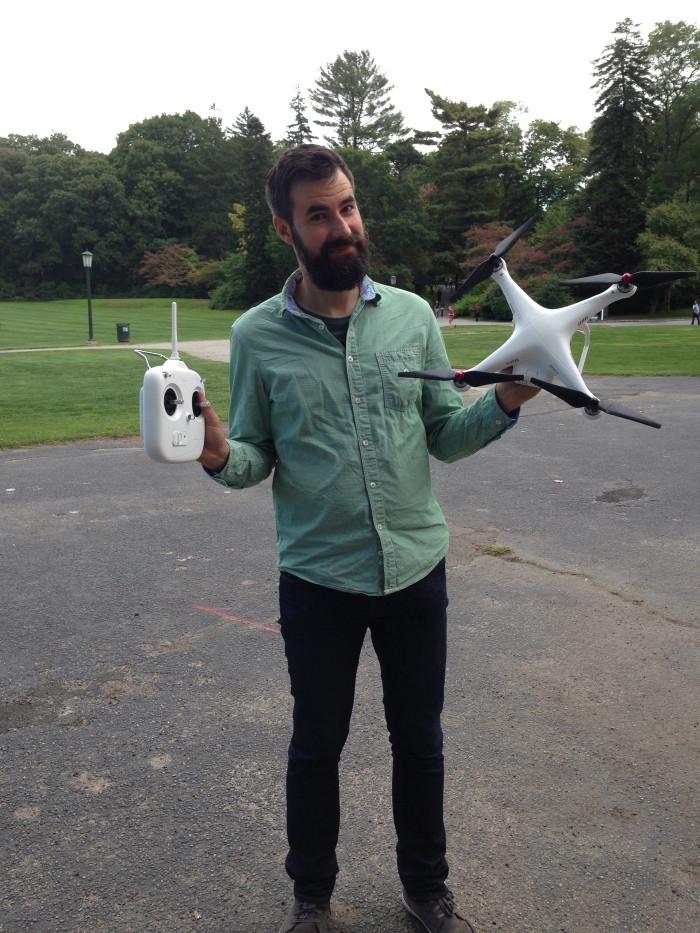By Alyssa Seidman
Co-Editor-in-Chief

When you enter the office of Benjamin ‘Benj’ Gerdes, an assistant professor of Media Arts, you feel as if you’ve stepped into the world of “Back to the Future,” where DeLoreans can transcend space and time. Gerdes is your resident Doc, without the crazy hair and lab coat. Although Gerdes isn’t developing a time- travelling car, he has a different innovation up his sleeve: a drone, which will be used for instructional purposes in his class Community Media Laboratory, included in the Spring 2015 schedule.
“The funds for the drone came from a previous teaching position [of mine] at Cooper Union in the School of Art where I was collaborating with an art historian,” Gerdes said. “We got a grant from the Menschel Teaching Fellowship, and that’s where the money for the drone came from. We were interested in tracing both the effects of drones in terms of how we visualize certain sights, conflicts, and issues, [and] also [the] broad history of aerial perspective.” The Menschel Teaching Fellowship, based at Cornell University, fosters a shared vision of teaching excellence at Cornell, and advances scholarly activities related to teaching and learning.
Gerdes explained his plans for the drone: “In the course, [we will] use [the drone] in an instructional setting, and see if there are ways that visual communication can be made more compelling [or] more effective by viewing things from an aerial perspective. Depicting overhead angles and things like that are kind of emerging possibilities for drone-use that are quite compelling to me, and that’s what I want to work with students to explore.” He continued, “Drones are one technology among many that we will be exploring in the course.”
The drone is a DJI Phantom 2 quad copter, which Gerdes specified would have a Go-Pro camera attached to the base of the craft in order to capture aerial images.
Gerdes expressed that he is aware of the negative implications associated with drone- use in recent history. “While I believe a good deal of regulatory oversight is clearly necessary regarding domestic drones, unmanned aerial vehicles (UAVs) have up to this point operated consistently in a legal gray area, and often much worse under international law. For example, reports from the United Nations, the Amnesty International, and the Human Rights Watch have all questioned the legality of U.S. military drone strikes in a series of separate reports in 2013. So, in some ways, the hazy legality of operating these, even on the level of consumer technology, seems built into the idea of the drone from the start: they are meant to do things people can’t do, and that’s what makes them both fascinating, useful, and potentially destructive as a technology.”
According to the Electronic Frontier Foundation’s article entitled, “The FAA Creates Thin Privacy Guidelines For The Nation’s First Domestic Drone ‘Test Sites,’” the Drone Aircraft Privacy and Transparency Act, issued by Senator Ed Markey (D – MA) in Nov. 2013, was intended to codify essential privacy and transparency requirements within the Federal Aviation Administration’s (FAA) regulatory framework for domestic drones and drone test sites. Following this act’s passage, the FAA released privacy requirements for six drones’ “test sites” that the agency will use to evaluate how drones will be integrated into domestic air traffic.
“It’s probably useful to think about regulation in relationship to the FAA and telecommunications monopolies, as there is now a commercial drone lobby, and I think it’s important we continue to explore the possibilities for activism and citizen journalism that drones might allow us in the same way that low-power [college] radio and cable access were legislated to balance the major commercial broadcasters,” Gerdes continued.
Will Bruner, a junior Broadcasting major, believes the Community Media Lab will be an exciting addition to the regular curriculum at Post. “I would take the course because there’s really nothing on campus like it, and from what I’ve seen from Professor Gerdes in the past it’s sure to be fun and informative,” Bruner said.
Jake Scotto, a senior Broadcasting major, said, “So far, I have taken three of [Benj’s] classes, and he has been excellent. Not only is he exceptionally knowledgeable in his field, he constantly engages classes with either readings or video clips pertaining to our discussions.”
Gerdes believes the drone will allow students to take part in a heightened level of technological experimentation within topical coursework. “There are multiple methods of technology such as motion-controlled cameras and time-lapse videos that are emerging ways of communicating and telling stories, [but] I actually see the drone as the most different or esoteric of those techniques; students should be engaging with [this], not just as technologies, but as creative tools [as well].” He added, “One of my jobs as an instructor is to get people to think about how to reinvent or expand the definition of how stories can be told, and I think drones can play a role in that potentially.
“I think it is a terrific thing for our [department] that Professor Gerdes will be sharing this piece of technology with our students,” said Dr. Barbara Fowles, the chair of the Media Arts department. Fowles also clarified to The Pioneer that the drone was not purchased with any LIU Post budget.
“[The new] course will [teach] students the aesthetics, logistics, and journalistic possibilities opened to them through the use of this new technology. The use of the drone in the campus environment will also offer opportunities to explore the privacy [and] safety issues associated with this technology.” She continued, “It is vital for media arts students to learn the effective and appropriate use of new technologies for information-gathering. Students are very lucky to have
the chance to become comfortable with this cutting-edge technology, which is rapidly becoming part of the media landscape,” Fowles said.


Be First to Comment